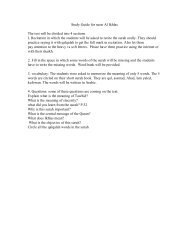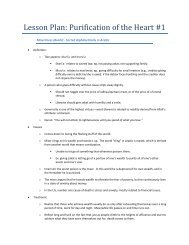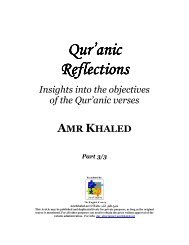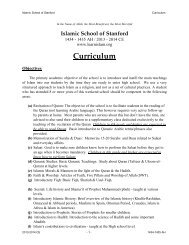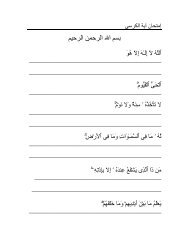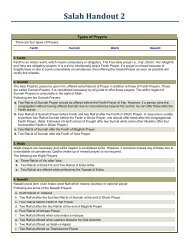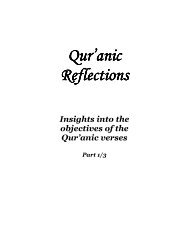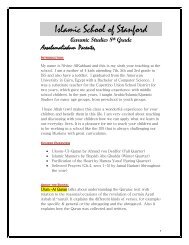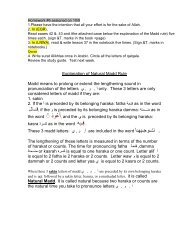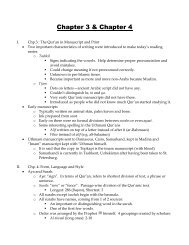Quranic Reflections - Islamic School of Stanford
Quranic Reflections - Islamic School of Stanford
Quranic Reflections - Islamic School of Stanford
You also want an ePaper? Increase the reach of your titles
YUMPU automatically turns print PDFs into web optimized ePapers that Google loves.
The Surah then gives an example that we all know well: Prophet Musa (AS). Allusion<br />
is made to stress the hardships he endured while he was performing Da’wa (the call to<br />
Allah) thanks to the care and support <strong>of</strong> Allah (SWT).<br />
The Surah conveys the message that even though the Qur’an is a method <strong>of</strong> happiness<br />
and rest, life will not be in smooth waters all the time without any problems or<br />
sorrows. Life is rather full <strong>of</strong> complications and difficulties, especially if you are a<br />
believer who carries the message <strong>of</strong> Allah (SWT) and calls for it. Nevertheless, such<br />
difficulties do not cause suffering (suffering in this context means sadness,<br />
depression, sorrow, or distress), because a believer is always connected to Allah<br />
(SWT) and seeking continuously his help and support. Accordingly, a believer is<br />
always satisfied and reassured.<br />
Illuminating words<br />
The story <strong>of</strong> Musa (SAWS) stresses the mercy and compassion <strong>of</strong> Allah (SWT) that<br />
mark the fact <strong>of</strong> experiencing difficulties in one’s life. The way the story is narrated in<br />
this Surah and the choice <strong>of</strong> words are totally different from those used to present<br />
other events in Musa’s life elsewhere in the Holy Qur’an. Allah (SWT) says what can<br />
be translated as, “When he saw a fire, he said to his family: “Wait! Verily, I have<br />
seen a fire; perhaps I can bring you some burning brand there from, or find<br />
some guidance at the fire.” (TMQ, 20:10).<br />
The Ayahs starts with a friendly question in order to support Musa (AS) in the hard<br />
mission and lighten the burden that he carried. Allah (SWT) says what can be<br />
translated as, “And what is that in your right hand, O Musa” (TMQ, 20:17).<br />
When Prophet Musa (AS) prayed for Allah (SWT), he asked according to what he<br />
knew about Allah’s (SWT) methodology: happiness, tranquility and facilitation. Allah<br />
(SWT) says what can be translated as, “[Musa] said: “O my Lord! Open for me my<br />
chest (grant me self-confidence, contentment, and boldness).”And ease my task<br />
for me; “And loose the knot (the defect) from my tongue, (i.e. remove the<br />
incorrectness from my speech)” (TMQ, 20:25-27). The Ayahs hence continue to<br />
address him gently and compassionately. Allah (SWT) says what can be translated as:<br />
“Allah said: “Grasp it and fear not; We shall return it to its former state” (TMQ,<br />
20:21); “(Allah) said: “You are granted your request, O Musa!” (TMQ, 20:36);<br />
“And indeed We conferred a favor on you another time (before).” (TMQ, 20:37);<br />
“And I endued you with love from Me, in order that you may be brought up<br />
under My Eye” (TMQ, 20:39).<br />
Do you see how many times the words “fear not” were repeated It serves as a pro<strong>of</strong><br />
for the victory Allah (SWT) grants for believers. This is the result <strong>of</strong> the trust Musa’s<br />
(AS) mother had in Allah (SWT), and her obedience to Allah (SWT) when He<br />
commanded her to throw her baby boy into the river. It is also a compensation for<br />
Musa (AS) who was then thrown as a baby in a dark box (ark). Musa’s (AS) mother<br />
exerted herself and got tired in resisting to her human weakness. In turn, Musa (AS)<br />
got tired <strong>of</strong> his confrontation with Firaawn (the Pharaoh). Yet, Allah (SWT)<br />
wonderfully reassured them. This is the situation <strong>of</strong> believers; despite the afflictions<br />
they may experience, they are always satisfied and reassured.



